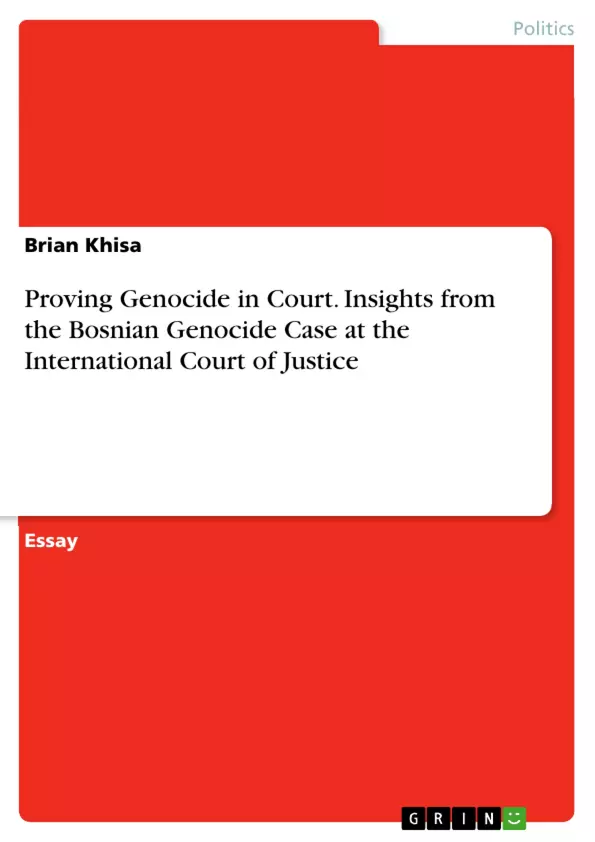This essay seeks to define the crime of genocide and assess the difficulty of proving it in court through a case study of the International Court of Justice (ICJ) Judgments in the Bosnian Genocide Case. The commentary provides a critical examination on the crime of genocide, as well as a comprehensive discussion on its legal framework and analytical note on the essential elements of the crime of genocide. The discussion will next analyze the implications of the court’s view on the prosecution and conviction of the crime of genocide, using the case study of the Bosnian Genocide Case before the ICJ as an illustration. Finally, the commentary will suggest some potential answers to the difficulty of establishing the crime of genocide before concluding. The argument advanced throughout the essay is that most horrible atrocities committed without "genocidal intent" will almost always fall short of the legal definition of genocide, therefore making it practically impossible to hold anyone accountable for the crime of genocide.
Inhaltsverzeichnis (Table of Contents)
- 1.0 INTRODUCTION.
- 2.0 LITERATURE REVIEW ON THE CRIME OF GENOCIDE.
- 2.1 DEFINING GENOCIDE AS THE “CRIME OF CRIMES”.
- 2.2 LEGAL FRAMEWORK ON THE CRIME OF GENOCIDE.
- 2.2.1 The Crime of Genocide.
- 2.2.2 The Genocide Convention
- 2.3 CRITICAL ELEMENTS TO PROVE THE CRIME OF GENOCIDE
- 2.3.1 Protected Group......
- 2.3.2 Genocidal Actions..\li>
- 2.3.3 Genocidal Intent...\li>
- 3.0 GENOCIDE DEFINED BUT UNPROVEN: A CASE STUDY.
- 3.1 THE BOSNIAN GENOCIDE CASE
- 3.2 ASSESSMENT OF THE ICJ JUDGMENT ON THE BOSNIAN GENOCIDE CASE
- 3.2.1 Protected Group of Bosnian Muslims
- 3.2.2 Genocidal Actions on the Bosnian Muslims to bring their Physical Destruction...
- 3.2.3 Genocidal Intent to Destroy the Bosnian Muslins in Part or in Whole.
- 3.3 THE UNRESOLVED CRIME OF GENOCIDE IN SREBRENICA
- 4.0 PROPOSED SOLUTIONS TO THE DIFFICULTY OF PROVING GENOCIDE.
- 4.1 EXPANSION OF PROTECTED GROUPS..
- 4.2 STATE RESPONSIBILITY FOR GENOCIDAL ACTIONS..
- 4.3 KNOWLEDGE-BASED APPROACH TO GENOCIDAL INTENT.
- 5.0 CONCLUSION.
Zielsetzung und Themenschwerpunkte (Objectives and Key Themes)
This commentary aims to define the crime of genocide and explore the difficulties in proving it in court. The analysis utilizes the case study of the International Court of Justice (ICJ) judgments in the Bosnian Genocide case to illustrate the complexities of prosecuting this serious international crime.
- Defining Genocide as the “Crime of Crimes”
- The Legal Framework of the Crime of Genocide
- Critical Elements to Prove the Crime of Genocide
- The Bosnian Genocide Case and the ICJ Judgment
- Challenges in Proving Genocide and Proposed Solutions
Zusammenfassung der Kapitel (Chapter Summaries)
The introduction sets the stage by discussing the severity of the crime of genocide, highlighting the requirement of “genocidal intent” for successful prosecution.
The literature review section delves into the definition of genocide as the “crime of crimes,” examining the legal framework surrounding it, including the Genocide Convention. It further analyzes the key elements necessary to prove genocide: the identification of a protected group, the demonstration of genocidal actions, and the establishment of genocidal intent.
The chapter on the Bosnian Genocide Case serves as a case study, examining the ICJ judgment and evaluating its assessment of protected groups, genocidal actions, and genocidal intent in the context of the Bosnian Muslims. It also explores the unresolved crime of genocide in Srebrenica.
The final chapter explores potential solutions to address the difficulty of proving genocide, proposing the expansion of protected groups, the assignment of state responsibility for genocidal actions, and the implementation of a knowledge-based approach to determine genocidal intent.
Schlüsselwörter (Keywords)
This commentary delves into the complex legal and practical aspects of genocide, exploring key concepts such as international law, the Genocide Convention, the ICJ, the Bosnian Genocide Case, genocidal intent, protected groups, and state responsibility.
- Quote paper
- Brian Khisa (Author), 2022, Proving Genocide in Court. Insights from the Bosnian Genocide Case at the International Court of Justice, Munich, GRIN Verlag, https://www.hausarbeiten.de/document/1438491


